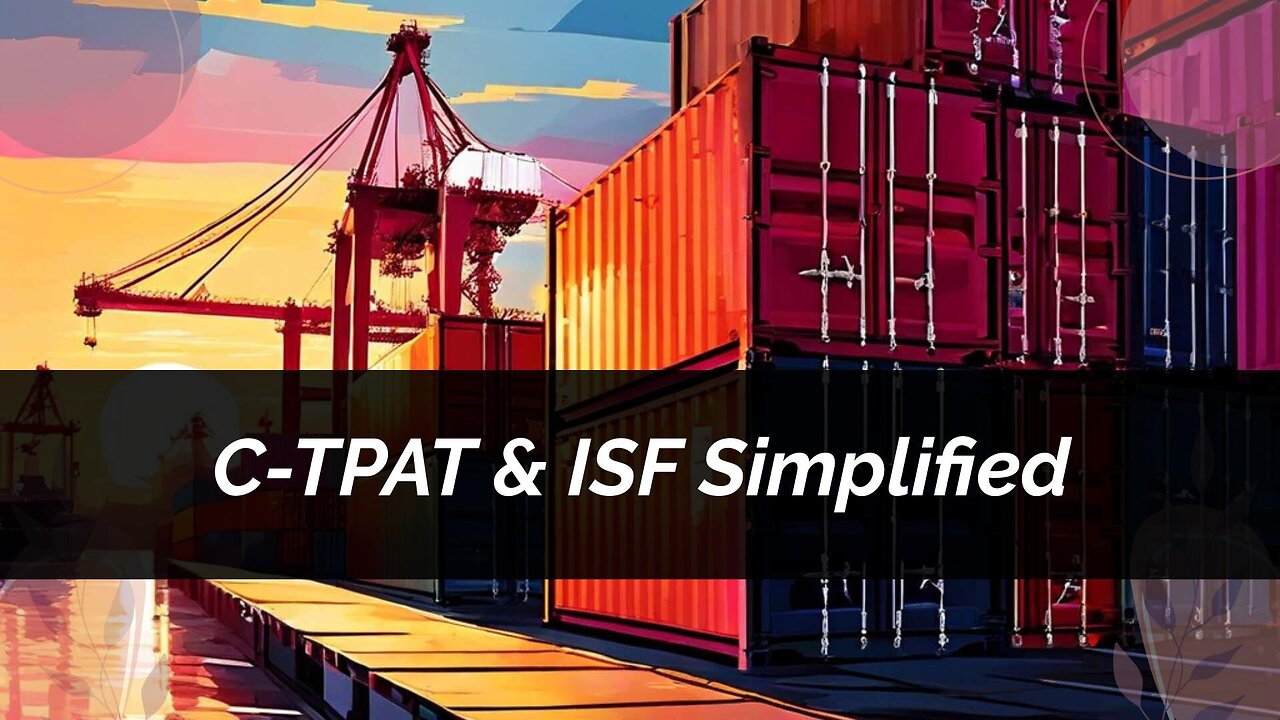Premium Only Content

Mastering C-TPAT and ISF Compliance: A Guide for Importers and Customs Brokers
ISF Solution | (832-904-9333)
clearance@isfsolution.com | www.isfsolution.com
In today's video, we deep dive into the concepts of C-TPAT and ISF compliance in customs brokerage. C-TPAT, the Customs-Trade Partnership Against Terrorism, is a voluntary trade partnership program established by the US Customs and Border Protection (CBP). Its primary goal is to enhance supply chain security while facilitating legitimate trade. To participate, companies must undergo a comprehensive application process, including a self-assessment of their supply chain security measures. Once approved, they become certified partners and receive benefits such as reduced examinations and expedited processing. ISF, or Importer Security Filing, is a requirement wherein importers must submit specific information about their shipments before they are loaded onto a vessel bound for the United States. This advance information assists CBP in assessing potential security risks associated with imported cargo. Importers can file the ISF themselves or authorize their customs broker to do it on their behalf. Additionally, we discuss the importance of customs bonds, which serve as financial guarantees for the payment of duties, taxes, and other fees to CBP. These bonds are required for most commercial shipments entering the United States and can be obtained through a surety company or a customs broker. Finally, we highlight the crucial role of customs brokers in ensuring compliance with C-TPAT, ISF, and customs bond requirements. These licensed professionals have in-depth knowledge of customs regulations and procedures, assisting importers and exporters in navigating the complexities of international trade while fulfilling legal obligations and avoiding penalties or delays. Compliance with C-TPAT, accurate and timely ISF filings, and obtaining a customs bond yield numerous benefits, including reduced cargo examinations, faster clearance times, and enhanced supply chain security. Overall, complying with these regulatory requirements is not only crucial for legal compliance but also an investment in the efficiency and success of import operations. To stay informed, it is essential to keep up with the latest customs regulations and consult with a qualified customs broker for guidance. Thank you for watching, and don't forget to like this video and subscribe to our channel for future updates.
#usimportbond #isfcustomsbroker #uscustomsclearing #isfentry
Video Disclaimer Here: For educational purposes - No affiliation with US government sectors.
-
 1:03:27
1:03:27
Glenn Greenwald
5 hours agoUK Pressures Apple to Break Encryption in Major Privacy Clash; How Dems Can Win Back the Working Class: With Former Bernie Sanders Campaign Manager Faiz Shakir | SYSTEM UPDATE #419
37.8K39 -
 47:39
47:39
Michael Franzese
4 hours agoJewelry King Trax NYC EXPOSES How the Powerful Steal from You
45.3K7 -
 LIVE
LIVE
Slightly Offensive
3 hours ago $2.86 earnedCandace REDPILLS the Masses in BOMBSHELL Theo Von Interview | Guest: Shane Cashman
1,072 watching -
 LIVE
LIVE
megimu32
3 hours agoON THE SUBJECT: IRL Streamers Attacked & Nostalgic Animal Movies That Made Us Cry
352 watching -
 1:00:54
1:00:54
The Tom Renz Show
7 hours agoMore Epstein/FBI, a Scary Trade War, & the Dem Echo Chamber
7.49K -
 40:43
40:43
Kimberly Guilfoyle
7 hours agoDems Double Down on Delusion-Why? Live with Tony Kinnett & Bo French | Ep.202
77.8K31 -
 1:28:42
1:28:42
Redacted News
6 hours agoBREAKING! SOMETHING BIG IS HAPPENING IN EUROPE ALL OUT WAR IS COMING AGAINST RUSSIA, TRUMP FURIOUS
121K273 -
 47:50
47:50
Candace Show Podcast
6 hours agoBREAKING: Judge Makes Statement Regarding Taylor Swift's Text Messages. | Candace Ep 155
113K110 -

Josh Pate's College Football Show
3 hours ago $0.29 earnedCFB’s Most Hated Teams | FSU & Clemson Future | Big Ten Win Totals | Star Rankings Overrated?
14.5K -
 1:33:47
1:33:47
CatfishedOnline
4 hours agoGoing Live With Robert - Weekly Recap
27.8K